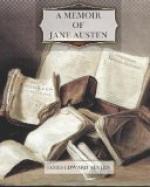pageantry with which George IV. was entertained in
that city. Even those great writers who hid
themselves amongst lakes and mountains associated with
each other; and though little seen by the world were
so much in its thoughts that a new term, ‘Lakers,’
was coined to designate them. The chief part
of Charlotte Bronte’s life was spent in a wild
solitude compared with which Steventon and Chawton
might be considered to be in the gay world; and yet
she attained to personal distinction which never fell
to Jane’s lot. When she visited her kind
publisher in London, literary men and women were invited
purposely to meet her: Thackeray bestowed upon
her the honour of his notice; and once in Willis’s
Rooms, {117} she had to walk shy and trembling through
an avenue of lords and ladies, drawn up for the purpose
of gazing at the author of ‘Jane Eyre.’
Miss Mitford, too, lived quietly in ‘Our Village,’
devoting her time and talents to the benefit of a
father scarcely worthy of her; but she did not live
there unknown. Her tragedies gave her a name
in London. She numbered Milman and Talfourd
amongst her correspondents; and her works were a passport
to the society of many who would not otherwise have
sought her. Hundreds admired Miss Mitford on
account of her writings for one who ever connected
the idea of Miss Austen with the press. A few
years ago, a gentleman visiting Winchester Cathedral
desired to be shown Miss Austen’s grave.
The verger, as he pointed it out, asked, ’Pray,
sir, can you tell me whether there was anything particular
about that lady; so many people want to know where
she was buried?’ During her life the ignorance
of the verger was shared by most people; few knew
that ’there was anything particular about that
lady.’
It was not till towards the close of her life, when
the last of the works that she saw published was in
the press, that she received the only mark of distinction
ever bestowed upon her; and that was remarkable for
the high quarter whence it emanated rather than for
any actual increase of fame that it conferred.
It happened thus. In the autumn of 1815 she
nursed her brother Henry through a dangerous fever
and slow convalescence at his house in Hans Place.
He was attended by one of the Prince Regent’s
physicians. All attempts to keep her name secret
had at this time ceased, and though it had never appeared
on a title-page, all who cared to know might easily
learn it: and the friendly physician was aware
that his patient’s nurse was the author of ‘Pride
and Prejudice.’ Accordingly he informed
her one day that the Prince was a great admirer of
her novels; that he read them often, and kept a set
in every one of his residences; that he himself therefore
had thought it right to inform his Royal Highness
that Miss Austen was staying in London, and that the
Prince had desired Mr. Clarke, the librarian of Carlton
House, to wait upon her. The next day Mr. Clarke
made his appearance, and invited her to Carlton House,




